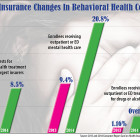New Law
State Prepares To Tighten Prescription Monitoring
|
Connecticut’s shift next month from weekly to “real-time” reporting of prescriptions for opioids and other controlled substances is an effective way to help stem opioid-related deaths, a new study suggests. Researchers from Vanderbilt University who analyzed states’ prescription drug monitoring programs – central databases that log controlled substances dispensed to patients — found that programs that were “updated with greater frequency” and that reported data for a broad range of drugs were associated with greater declines in opioid-related deaths. The study in the journal Health Affairs comes as Connecticut prepares to put a policy in place requiring that pharmacies report controlled substance (Schedule II to V) prescriptions “immediately,” or at least within 24 hours after they are dispensed, into the central database, known as the Connecticut Prescription Monitoring and Reporting System (CPMRS). The CPMRS, maintained by the Department of Consumer Protection, can be accessed by doctors and pharmacists to give them a complete picture of a patient’s medication use, including prescriptions by other providers. It also can be used by law enforcement officials to investigate physician prescribing.

